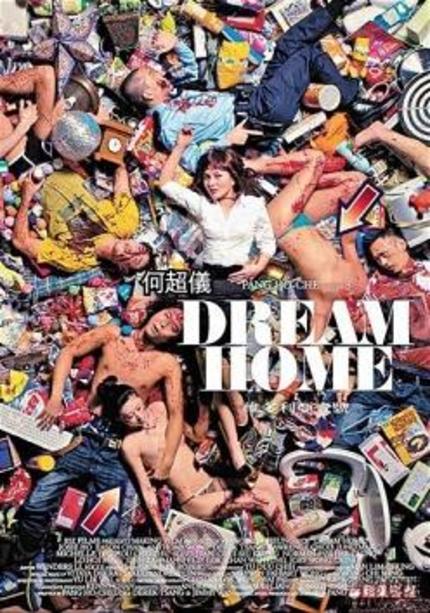GRIMM UP NORTH 2010: DREAM HOME review

Criticising Edmond Pang's ultraviolent slasher Dream Home feels like delivering a petty kicking, but one the man's been due a long time. Pang is still without doubt one of the most talented, consistently interesting directors left in Hong Kong's ailing film industry, and Dream Home has moments of absolute world-class cinematic brilliance with few equals in 2010. But it suffers worst of all his output from his trademark weaknesses - style over substance, dubiously relevant social commentary, lack of depth - to the point you actually start to question how much mileage his signature techniques have left.
Pang's cause celebre this time around is Hong Kong's bloodthirsty property market, the toll it demands in human misery and the lengths people are prepared to go to to secure a pricey apartment with a harbour view. Josie Ho plays Sheung, a young woman who grows up in a dirt-poor neighbourhood, clawing and scraping her way up the ladder while life throws crisis after crisis at her.
Unscrupulous corporate alliances forcibly evict her and her childhood friends from their homes. The jobs she has to take are all soul-destroying menial drudgery. She's forced to resort to adultery with a slimy philanderer (Eason Chan in a minor supporting role) prepared to hand her a bit of extra money for sexual favours. And it only gets worse.
Sheung's fixated on the dream of owning 1 Victoria Bay in the apartment block that went up over her childhood home. She wants to give her elderly father the view over the ocean he could never afford, and she depends so completely on this goal that when things look like going badly wrong, she's forced to resort to drastic measures to get her plans back on track.
To get the obvious question out of the way, that's drastic in the extreme. Pang and Josie Ho (who executive produced) clashed publicly over Dream Home's content, with the media speculating Ho objected to the savagery on display. Either way Pang pointed out his contract meant he got to approve the final cut, and clearly he saw no point in doing a slasher movie by halves. Dream Home is tremendously violent, with Sheung's victims stabbed, garotted, choked, disembowelled and more besides.
Predictably, Pang's stamp as an auteur is all over the film, with most of the kills as chillingly, blackly funny and/or visually inventive as they are sickening. Dream Home is often very guiltily comic, be it Sheung venting her fury in increasingly horrifying ways or her sweetly foul-mouthed conversations with her best friend as a child.
Technically, too, it's a thing of (frequently ghastly) beauty - cold and grimy where Isabella was saturated with colour, but with a similar artistic polish. It's relatively narrowly focused, with only a few locations and most of those interiors, but it's tightly, brilliantly shot and manages a remarkable use of limited space. The gore is lovingly, horribly detailed, perhaps more fantastical than realistic (people surviving appalling injuries to stumble around maimed and pleading) but still genuinely shocking.
Credit is due Josie Ho, long under-rated as an actress, for making Sheung credibly human if not exactly sympathetic. Put bluntly, she's clearly a sadistic psychopath, but Ho plays her as painfully, tragically desperate to the point the viewer starts feeling perversely invested in what becomes of her lunatic ambition.
Yet while Dream Home is clearly at pains to establish Sheung's been terribly hard done by, it never feels as if she's had it tough enough. While the social tensions in her backstory are perfectly real - property is priced sky high, and countless people skirt the breadline in an attempt to live beyond their means - none of it quite seems to justify inflicting prolonged, sickening agony and degradation on other human beings. Pang clearly knows and loves Hong Kong, with the script bundling in any number of believable, acutely realised social observations, but there are clearly plenty of real-life people who have it worse than Sheung yet who don't resort to mass murder to vent their frustration.
Structurally, too, Dream Home falls flat. Pang jumps backwards and forwards in time, dividing the climactic killing spree between flashbacks to Sheung's childhood, and while the editing is as slick as any other aspect of the production it's questionable whether it really adds that much to the film, given we know what happens, how and why, and we can see why isn't really cutting it. Much of the action ends up concentrated in one place for long stretches of the running time, and it starts to seem like more of a parade of showboating unpleasantness than anything else.
It's
never remotely a bad film. Even second-rate Edward Pang is still far
removed from his immediate competition, and Dream Home is no
exception. Beyond the superlative production values gorehounds will
be more than satisfied, and the drama is certainly compelling enough
to hold the more discerning viewer's attention. But it is second-rate
Pang, it could clearly have been so much more and though it comes
recommended (for those with strong stomachs, obviously) that comes
with some frustrating reservations.
(Dream Home screened as part of Manchester's Grimm Up North 2010.)







